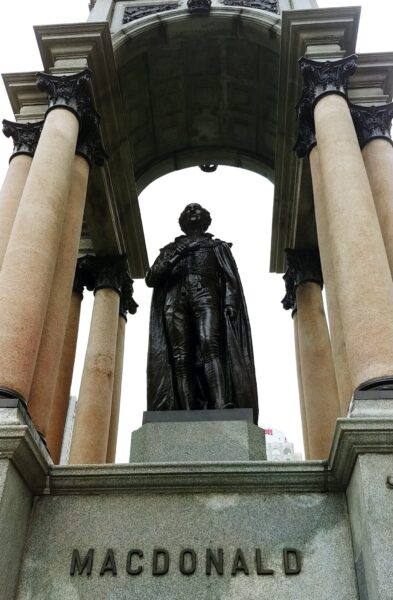Ford is right to bring Macdonald back into the light
Roderick Benns is the publisher of The Advocate. An award-winning author and journalist who grew up in Lindsay, he has written several books including Basic Income: How a Canadian Movement Could Change the World.

God knows I’ve disagreed with Premier Doug Ford on many things. His cancellation of the Ontario Basic Income Pilot. His obsession with building highways and tunnels. His overuse of the word ‘folks,’ if I were to get particularly granular.
But his plans this summer to lift the wooden box that is hiding Sir John A. Macdonald is not one of them. On this, he should be supported.
Historian Charlotte Gray, in the Globe and Mail, recently writes “in the past 20 years, Canadians have turned their backs on the past, preferring to tear down statues of Sir John A. Macdonald rather than explore his tangled legacy.” Or columnist Robyn Urback, in the same newspaper: “It’s taken five years, but finally we’ve realized that a proud country does not put its first prime minister in a box.”
Indeed. In Patrice Dutil’s new masterful microhistory: Sir John A. Macdonald & the Apocalyptic Year 1885, he points out the annihilation of Macdonald’s reputation began in 2015, the year of the Truth and Reconciliation Commission and its indictment of the Indian residential school system. No one I know of defends this unacceptable policy from 150 years ago.
As Roy MacSkimming points out in his review of Dutil’s new book on Macdonald in Canada’s History magazine, Macdonald’s name “has been expunged from schools, institutions, even a parkway in the nation’s capital. Long honoured as the principal creator of Canada, Macdonald has been reduced to a non-person in his own country.”
As we celebrate Canada Day this year, that legacy deserves more balanced scrutiny than we’ve seen from school boards, academia, and in some government circles. Much of the trashing of Macdonald has been about the hunger Indigenous people faced in Canada’s vast northwest at a time when bison populations were in steep decline. And yet as Dutil shows, the first PM made unprecedented efforts to prevent starvation on the prairies, allocating as much money to food relief as his government spent on the entire justice system, despite strong opposition in Parliament.
This was a time when there was near unanimous belief that the white race – British in particular – was superior to all others. And yet race, as the author notes, hardly registered as of personal importance to our first PM. Macdonald believed that with exposure to culture and education, anyone could become a good British subject and integrate into a European-dominated society – a “racially enlightened perspective in 1885,” writes Dutil.
It takes courage to own up to mistakes of the distant past, like residential schools. And it also takes courage to halt this social contagion of Macdonald bashing, being passed off as scholarly, liberal enlightenment.
Unbox the statue of Macdonald. Have real conversations. The worst thing we can do to address a complex legacy is to choose simplistic answers, like tearing down statues. The nation we all seem ready to defend today against U.S. aggression is the same nation Macdonald spent his lifetime creating. The least we can do is to have a few elbows up on his behalf.





Thank you Roderick Benns…a light in the darkness of narrowmindedness and shortsightedness. At my age (80yo) I hope I’ve learned to view life with a wider lens and temper opinion with knowledge. I am blessed to have been born in this country where all sides may be heard and all lives matter.
I too support the Ontario decision to unbox the statue of Canada’s first PM at Queen’s Park. Due to the threat of damage to the statue, taxpayers must pay for 24/7 security for the unboxed statue but that is a price of freedom and democracy where peaceful protest and dissent are protected by law. Hopefully, going forward, Canadians can learn to appreciate our leaders – like each of us – are complex characters, mortal beings all.